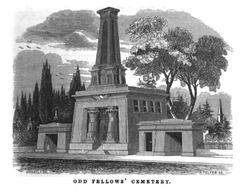Odd Fellows Cemetery was a 32 acre cemetery located North and South of Diamond Street and between 22nd and 25th Street[1] in the North Philadelphia West neighborhood of Philadelphia, Pennsylvania. It was established in 1849 by the Odd Fellows fraternal organization for the burial of their members. The eighty-one foot high, brown stone, Egyptian Revival gatehouse was designed by architects Stephen Decatur Button and Joseph C. Hoxie.[2]
| Odd Fellows Cemetery | |
|---|---|
 Odd Fellows Cemetery entrance gate | |
 | |
| Details | |
| Established | 1849 |
| Location | 24th and Diamond Streets, Philadelphia, Pennsylvania |
| Country | United States |
| Coordinates | 39°59′12″N 75°10′22″W / 39.9867°N 75.1727°W |
| Type | private |
| Owned by | Odd Fellows |
| Find a Grave | Odd Fellows Cemetery |
The Odd Fellows Cemetery was located a short distance from Old Glenwood Cemetery and adjoined the smaller United American Mechanics' Cemetery.[3]
The cemetery was a part of the United States National Cemetery System during the American Civil War with a leased lot within the cemetery for 277 soldiers[4] that died in nearby hospitals. The soldiers' remains were reinterred to the Philadelphia National Cemetery in 1885.[5]
In 1951, the cemetery property was acquired by the Philadelphia Housing Authority for construction of the Raymond Rosen housing project.[6] The bodies were moved to two other cemeteries owned by the Odd Fellows – Mount Peace Cemetery in Philadelphia and Lawnview Memorial Park in Rockledge, Pennsylvania.[7] However, in 2013, workers unearthed 28 graves and remains that were not moved and were still under the playground of the William Dick school built in 1954.[8]
Notable burials
edit- Manuel Azadigian (1901–1924), painter and sculptor
- Peter Cross (1815–1862), U.S. Mint assistant engraver
- Charles Kochersperger (1826–1867), Union Army officer
- George Lippard (1822–1854), Novelist, journalist, playwright, social activist and labor organizer[7] The Lippard grave and memorial were moved to Lawnview in 1951.[9]
- John Francis Staunton (1821–1875), Union Army Colonel[10]
References
edit- ^ "Odd Fellows' Cemetery – Closing and Re-interment at Lawnview". The Philadelphia Inquirer. 5 January 1951. p. 44. Retrieved 27 January 2022.
- ^ Smith, R.A. (1852). Philadelphia as it is in 1852. Philadelphia: Lindsay & Blakiston. pp. 355–357. Retrieved 27 January 2022.
- ^ United States Congressional Serial Set, Volume 1479. Washington: Government Printing Office. 1872. p. 12. Retrieved 27 January 2022.
- ^ Message of the President of the United States and Accompanying, to the Two Houses of Congress. Washington: Government Printing Office. 1868. p. 931. Retrieved 10 January 2022.
- ^ Holt, Dean W. (2009). American Military Cemeteries, 2d ed. McFarland. pp. 397 [233]. ISBN 978-0786440238.
- ^ Oordt, Darcy (2015). Haunted Philadelphia: Famous. Guilford, Connecticut: Globe Pequot. p. 250. ISBN 978-1493015795. Retrieved 27 January 2022.
- ^ a b Thomas H. Keels (2003), Philadelphia graveyards and cemeteries, Arcadia Publishing. ISBN 978-0738512297. pp. 120–121.
- ^ Haas, Kimberly (10 February 2020). "Playing on Hallowed Ground: Hidden Cemeteries and the Modern City". www.hiddencityphila.org. Retrieved 11 February 2020.
- ^ Ehrlich, Eugene and Gorton Carruth (1982). The Oxford Illustrated Literary Guide to the United States. New York: Oxford University Press, p. 205. ISBN 0195031865
- ^ Hunt, Roger D. (2007). Colonels in Blue: Union Army Colonels of the Civil war – The Mid-Atlantic States: Pennsylvania, New Jersey, Maryland, Delaware and the District of Columbia. Mechanicsburg, PA: Stackpole Books. p. 157. ISBN 978-0811702539. Retrieved 27 January 2022.